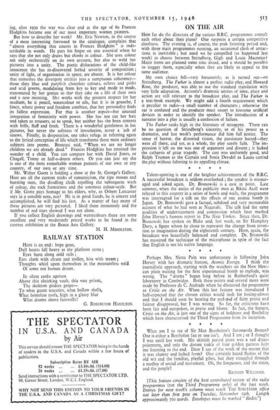ON THE AIR
How far do the directors of the various B.B.C. programmes consult each other about their plans? One suspects a certain competitive aloofness. The evening is, of course, the peak listening period and, with three main programmes running, an occasional clash of attrac- tions is inevitable ; but need we be compelled (as happened last week) to choose between Strindberg, Gigli and Louis Macneice? Major items are planned some time ahead, and it should be possible to stagger them, especially when they are likely to appeal to the same audience.
My own choice fell—very fortunately, as it turned out—on Strindberg. The Father is almost a perfect radio play, and Howard Rose, the producer, was able to use the standard translation with very little adaptation. Aristotle's dramatic unities of time, place and action are still relevant so the broadcast play, and The Father is a text-book example. We might add a fourth requirement which is peculiar to radio—a small number of characters ; otherwise the ear is confused and the producer must resort to tiresome artificial devices in order to identify the speaker. The introduction of a narrator into a play is usually a confession of failure.
The Father ranks high in the literature of misogyny. There can be no question of Strindberg's sincerity, or of his power as a dramatist, and last week's performance did him full justice. The sense of horror, the distorted vision, the passionate hatred—they were all there, and yet, as a whole, the play surely fails. The im- pression it left on me was one of argument and dissent ; it lacked the catharsis of great tragedy. The cast was uniformly good, and Ralph Truman as the Captain and Sonia Dresdel as Laura carried the play without faltering to its appalling climax.
* * * * Talent-spotting is one of the brighter achievements of the B.B.C. A successful broadcast is seldom overlooked ; the speaker is encour- aged and asked again. Dr. Bronowski is a case in point. Last summer, when the antics of the publicity men at Bikini Atoll were relayed to this country in a series of howls and wails, the programme was interrupted for a talk on the effects of one atomic bomb in Japan. Dr. Bronowski gave a factual, subdued and very memorable account of what he had seen at Nagasaki. The talk had the same qualities of understatement and compassion which later marked John Hersey's famous report in The New Yorker. Since then, Dr. Bronowski has spoken on Blake and, last week, on Sir Humphry Davy, a figure whom he chose to represent the change from inven- tion to imagination during the eighteenth century. Here, again, the broadcast was beautifully balanced and complete. Dr. Bronowski has mastered the technique of the microphone in spite of the fact that English is not his native language.
* * * * Perhaps Mrs. Nesta Pain was unfortunate in following John Hersey with her dramatic feature, Atomic Energy. I think the journalistic approach, starting with the watchers on the New Mexi- can plain waiting for the first experimental bomb to explode, was wrong. The "drama " began long before in Rutherford's quiet laboratory in Cambridge. Both these points and several more were made by Professor da C. Andrade when he discussed the programme as Critic on the Air. When this last feature was introduced I half-expected that the chosen critics would rush for boxing-gloves and that I should soon be hearing the pad-pad of faint praise and fainter disapproval, but I was wrong. So far, the criticisms have been fair and outspoken, in praise and blame. In fact, the feature, Critic on the Air, is just one of the signs of boldness and flexibility which have characterised the Third Programme from its inception.
What am I to say of Sir Max Beerbohm's Savonarola Brown? One is either a Beerbohm fan or one isn't. And I am ; or I thought I was until last week. His skittish period piece was a sad disap- pointment, and only the distant tinkle of four golden guineas kept me listening to the end. Dare I say of the work of the master that it was clumsy and lacked form? One certainly heard flashes of the old wit and the familiar, playful gibes, but they struggled through a medley of sound and movement. Oh, the longueurs, and the noise, and the people!
RICHARD WILLIAMS.


































 Previous page
Previous page